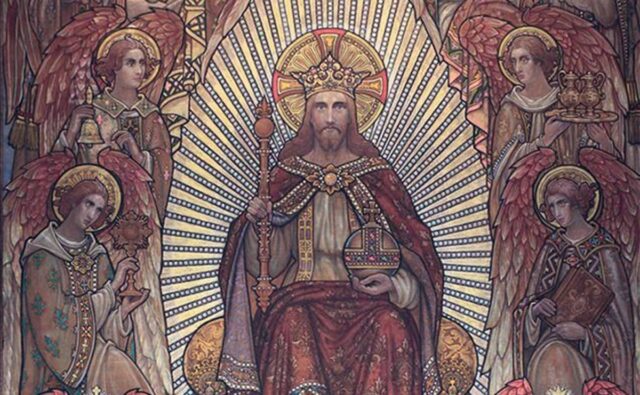This week, we celebrate the Feast of Christ the King, we are called to work with this King.
And this King is the one who dies on the cross, rises from the dead, and is with his people. And what then is expected of us?
A google search for images of Christ the King adds pictures that look very much like St. Louis, King of France – and many more.
If we take them seriously, true icons lead us to contemplate the mystery of Christ, others may trivialise him or even seem heretical.
What do we celebrate on this last Sunday of the Church year? The feast called the Solemnity of Christ, King of the Universe is less than a century old, a very recent addition in light of our 2,000-year history.
Pope Pius XI said he established this feast in 1925 to combat the rise of secularism and nationalism. Although the name sounds ostentatious, the Gospels convey a distinctly different tone.
Luke’s Gospel doesn’t refer to Jesus as a King until the time of his passion.
Then Luke tells us that when Jesus made his triumphant entry into Jerusalem, the crowd on that day cried out, “Blessed is the King who comes in the name of the Lord!” and soon thereafter shouted, “Crucify him!”
Jesus avoided claiming the designation for himself when Pilate asked him, “Are you the King of the Jews?” At the crucifixion, his executioners turned the title into a way to mock him.
Luke’s way of using the term indicates that if we want to think of Christ as a King, we must allow Jesus’ own actions to define the meaning of his kingship.
In Luke’s Gospel, Jesus exercises his sovereignty by pardoning his persecutors and offering a place in his kingdom to a condemned criminal. He demonstrates his intimate relationship with God through the filial obedience of saying, “Not my will, but yours be done.”
Jesus exhibited his invincibility by accepting death with unshakable faith in the Father’s power to give life. In other words, Jesus lived up to the title placed over his head by redefining kingship, revealing what it looks like in the divine realm rather than in the world of politics and power.
As we celebrate this feast, the Gospels prod us to examine how seriously we want to take it. Paul not only called Christ the image of the invisible God, but also said that God has made us fit to participate in his kingdom.
It is our choice. Jesus’ life reveals that obedience is the way to share in divine life. Jesus’ practice of forgiveness shows us how to live in true freedom.
His passion and death reveal what God’s power is like. Christ the King offers us a model of grace, liberty and unfathomable love.
Christian art is graphic theology. The Christian community makes theology experiential. The life of the baptised can never be neutral. We who pray, “Thy kingdom come,” are always presenting an image of Christ to the world.
Our history is replete with heretical dominating images that mirror the power structures of our world.
Our call is to create communities that provide true icons of Christ’s kingship expressed through the grace of God’s reconciling love and life-giving power.
I would like to close this with a message from Mother Teresa. And it tells us what real authority is; and what we, as followers of Jesus, should follow in the authority of love; what we ourselves should become if we are forever to touch the Kingdom of God.
Because God is love, and unless we learn to love as Jesus loves, we will never touch God. Here is what Mother Teresa says:
“Many today are starving for ordinary bread, but there is another kind of hunger – the hunger to be wanted, the hunger to be loved, the hunger to be recognised. Nakedness too is not just the want of clothes, but also about loss of dignity, purity, and self-respect.
“And homelessness is not just want of a house; there is the homelessness of being rejected, of being unwanted in a throwaway society. The biggest disease in the world today is the feeling of being unwanted and uncared for.
“The greatest evil in the world is lack of love, the terrible indifference towards one’s neighbour. Lord, warm our cold hearts with your grace, so that we your disciples may produce the fruits of love as you have taught us and with this love we shall overcome the world.”
SEE ALSO – You can read all of Fr Paddy’s columns by clicking here

























